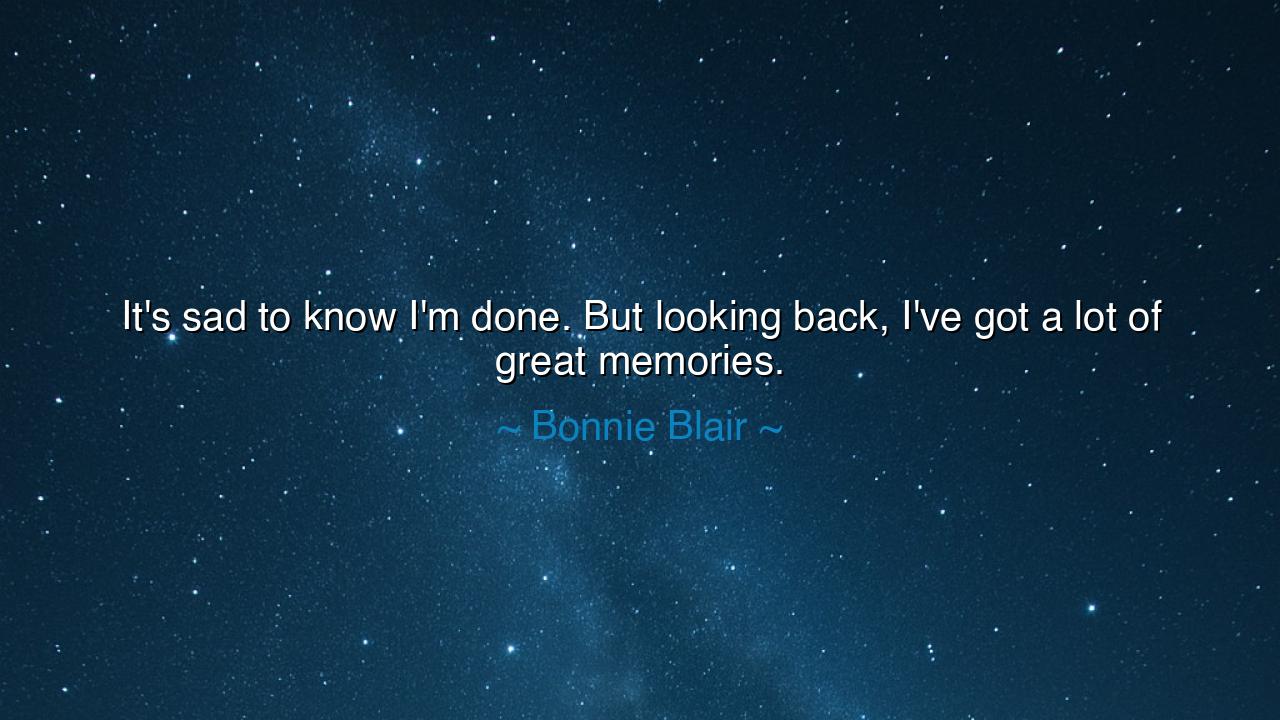
It's sad to know I'm done. But looking back, I've got a lot of






The words “It’s sad to know I’m done. But looking back, I’ve got a lot of great memories” were spoken by Bonnie Blair, one of the most celebrated speed skaters in Olympic history — a woman whose strength, grace, and endurance carved her name into the ice and into the hearts of a nation. Yet when her racing days came to an end, she did not speak of medals, fame, or victory; she spoke of memory, of the bittersweet stillness that follows the storm of purpose. Her words capture a truth as old as time — that every great journey, no matter how glorious, must one day find its end, and that the noblest heart is the one that can look back with gratitude rather than regret.
In her statement lies the dual nature of completion: the sorrow of ending, and the peace of fulfillment. To say “It’s sad to know I’m done” is to acknowledge the ache of transition — the quiet grief that comes when the path that once defined you comes to a close. But the second half of her words transforms that sadness into wisdom: “I’ve got a lot of great memories.” This is not a lamentation, but a hymn of thanksgiving. For the one who has lived fully, who has poured their spirit into their calling, the end of a chapter is not a loss, but a harvest. The ancients would have said: “Mourn not the setting sun, for it has given the day its light.”
Bonnie Blair’s life in sport was a testament to discipline, humility, and joy. Across five Olympic Games, she raced with precision and heart, winning five gold medals and setting world records. But when her career concluded, she did not cling to her triumphs; she released them with grace. In doing so, she embodied the wisdom of the Stoics — that true greatness lies not only in victory, but in knowing when to let go. The warrior who knows when to sheath the sword is wiser than the one who clings to battle. For every human endeavor, even the grandest, must bow before the passage of time.
History gives us many who have faced this same reckoning. Consider Alexander the Great, who, after conquering the known world, wept because he had no more worlds to conquer. His was a sadness born not of failure, but of completion — the emptiness that follows great achievement. Yet unlike Alexander’s restless sorrow, Bonnie Blair’s reflection holds serenity. She finds not emptiness in the end, but fullness, not despair, but remembrance. She teaches us that the end of purpose does not erase the meaning of the journey — it illuminates it. The memories we carry are the eternal rewards of fleeting time.
There is a deeper lesson here about the impermanence of glory. Every stage of life — youth, achievement, vitality — must yield to the next. But what endures is the spirit with which we live each moment. When we give ourselves completely to our pursuits, when we meet challenges with courage and gratitude, we build a treasury of memory that time cannot steal. To look back and say, “I have great memories,” is the truest form of victory — for it means one has lived awake, has loved their craft, and has left a mark not of pride, but of joy.
This quote also speaks to the courage of acceptance. To step away from what you love, to face the unknown that follows, requires strength greater than competition itself. The ancients admired not the one who wins endlessly, but the one who departs with dignity. Like a seasoned sailor returning from the sea, Bonnie Blair gazes back not with longing, but with reverence for the waves she has conquered. Such is the way of all things: every life, every career, every season of passion must one day close — but those who walk their path with heart will find that their memories become their immortality.
The lesson, then, is clear: pour yourself into the present so that when it becomes the past, you will have no bitterness, only gratitude. Strive with all your might, but learn to release what has run its course. Build not only achievements, but moments that will live within you when the applause fades. For when the time comes to say, “I’m done,” you will not face emptiness, but abundance — the wealth of a life well-lived.
So, children of tomorrow, remember this teaching: life is a race not of speed, but of meaning. Run it with passion, with integrity, with love. When your season ends — as all seasons do — do not fear its close. Instead, look back upon your path and smile, as Bonnie Blair did, and say with quiet pride, “I have great memories.” For the greatest victory is not found in the trophies we hold, but in the peace we carry when the race is done.






AAdministratorAdministrator
Welcome, honored guests. Please leave a comment, we will respond soon